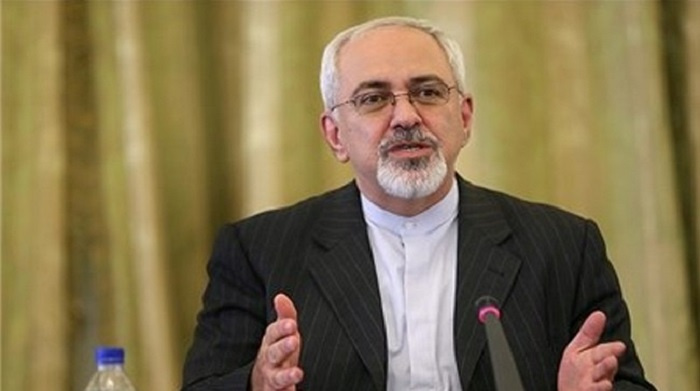JCPOA Is an Opportunity for Iran

Vaghaye Ettefaghiyeh daily has published an interview with Iranian Foreign Minister Mohammad-Javad Zarif on the day expected to coincide with the implementation of a landmark deal between Iran and world powers. In the interview below, Zarif has answered various questions ranging from the JCPOA to Iran’s presidential election in 2021.
Some of your critics believe the JCPOA will lead to trouble for Iran. What do you think now that the JCPOA is on the verge of implementation?
Zarif: My colleagues and I are of the belief that the JCPOA is an opportunity for the country -- an important opportunity for the Islamic Republic.
We hear plenty of such claims these days. Why do you, as the Foreign Minister, say that the JCPOA is an “opportunity”?
Zarif: Because the JCPOA and its implementation did reveal the lies of those who sought adventures against the country through Iranophobia. Secondly, it took away from our enemies the potential to form a global consensus to isolate Iran. The JCPOA has provided new grounds for Iran in the region as well as in international and economic equilibriums. If we take the best advantage of the situation, the JCPOA is definitely an opportunity for us. However, if we fail to do so, the opportunity will be annihilated or can even be turned into a threat in the post-JCPOA era.
How can we utilize the opportunity in the post-JCPOA era?
Zarif: If we move forward with initiative and plan for ourselves, abundant opportunities will be provided for us, but if we are engaged in internal disputes and let others plan for us, the opportunity will definitely be lost and probably turned into a threat. The post-JCPOA era has formed only an atmosphere and it is not a predetermined state. If we fail to use the atmosphere, it is not clear what will come next. We should have plans. At the post-JCPOA stage, we consider attracting investment, boosting exports of non-oil commodities and technical engineering services as benchmarks for our representatives. It does not only include the ambassadors but also our decisions one day to terminate some of diplomatic missions. In fact, we will evaluate what missions are providing more employment and investment inside the country. Thus, if you use the JCPOA in this manner, it will provide the grounds for your influence, but if you fail to do so and remain passive, the JCPOA will be the premise for the influence of others.
Could you guarantee that the P5+1 remains committed?
Zarif: No one can provide guarantees regarding others’ conduct but I can say that our nuclear capabilities will be resumed much faster than the reestablishment of a sanctions regime.
What was your most difficult day during your tenure as the foreign minister?
Zarif: We have had many difficult days but the final days of the negotiations were more difficult and I will never forget them. There were times I wanted to stop the talks and return to Tehran. I had really arrived at the decision but each time, after an exchange of messages, solutions were put forward and we would become hopeful again.
Some compare you with the late Mr. Mosaddegh, particularly because your backaches, as they say, depended on encounters during the day. How true is this?
Zarif: I basically disagree with such comparisons because I am really not comparable with great men such as the late Mr. Mosaddegh or his likes and do not consider myself to be in such a position.
Some say you faked your backache sometimes.
Zarif: No, I never did that. I really did have backaches because of stress and pressure. In the very first round of the talks, I had to deal with it too, and I did my best to hide it but reporters found it despite our wishes.
I would like to talk about your job inside the foreign ministry. You took two new measures in choosing ambassadors. One was the selection of Mr. Adibi as a Kurd and Sunni ambassador and the other was the appointment of a woman ambassador. Did you have any problems doing so? Why did you choose a woman ambassador?
Zarif: It is usually a little difficult to do something new. There are different and of course respect-worthy views in our country. Some are naturally against women’s engagement in some positions but the majority of our society believes that officials should accept responsibility based on their qualifications.
Will you continue the appointment of women or Sunni ambassadors?
Zarif: Yes, if there are individuals qualified to work as ambassadors, we will definitely be open and will go on doing so.
Who do you think will be your rival in the 2021 elections?
Zarif: I have never thought about this because I think to imagine this would be divination never to be realized. I did the only thing I knew in foreign policy. The truth is I did not want to accept the heavy burden of responsibility as the foreign minister. Mr. Rouhani, my family and friends insisted and I complied. In contrast with the past when my family was against accepting responsibilities, this time they asked me to accept in case I could help.
Have they ever regretted their insistence?
Zarif: Sometimes they do. When they see how under pressure I am at home, they do -- when I stand nine hours on my feet in Syrian talks, trying to stop the ratification of negative issues against the interests of the people in Syria and the region, and then I hear unfair criticism.
Will you accept to be foreign minister for the next presidential term if the position is offered to you?
Zarif: I do not insist to be a minister even for the next two years. I have always wished to be able to work as long as I could serve. Of course, I will not have the right to shrug as long as responsibility is on my shoulder.

